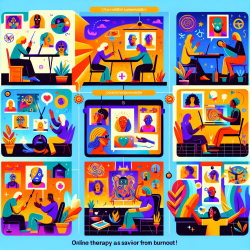In the realm of special education, addressing problem behaviors in children with Fragile X Syndrome (FXS) has always been a significant challenge. These behaviors, which include aggression and self-injury, not only affect the child's well-being but also place a considerable strain on their families. However, a recent study titled "Telehealth-enabled behavioral treatment for problem behaviors in boys with fragile X syndrome: a randomized controlled trial" has shed light on a promising solution: telehealth-enabled Functional Communication Training (FCT).
Conducted by researchers from Stanford University and the Behavior Change Institute, this study explored the efficacy of delivering FCT via telehealth to boys aged 3 to 10 years who exhibited daily problem behaviors. The results were nothing short of inspiring.
Key Findings
- Significant Reduction in Problem Behaviors: Boys who received FCT via telehealth showed a 91% decrease in problem behaviors from baseline. This included substantial reductions in aggression, self-injury, and tantrums.
- Improved Parenting Stress Levels: Caregivers reported lower levels of stress related to their child's behavioral problems. The study also noted high treatment acceptability among caregivers.
- Cost-Effective and Accessible: Telehealth-enabled FCT proved to be a practical solution for families in rural or medically underserved areas, overcoming the geographical barriers that often limit access to specialized behavioral treatments.
Practical Implementation for Practitioners
As special education practitioners, it's crucial to stay abreast of innovative treatment methods that can enhance the quality of life for our students and their families. Here are some actionable steps to implement the findings from this study:
- Explore Telehealth Platforms: Evaluate and select a telehealth platform that complies with privacy regulations and is user-friendly for both practitioners and families.
- Training and Support: Provide training for caregivers on how to implement FCT via telehealth. This includes setting up the necessary technology and offering ongoing support.
- Monitor and Evaluate: Regularly assess the child's progress and make adjustments to the treatment plan as needed. Use standardized tools like the Aberrant Behavior Checklist-Community (ABC-C) to track changes in problem behaviors.
- Collaboration: Work closely with families to ensure they feel supported and confident in implementing the treatment. Address any concerns or challenges they may face during the process.
Encouraging Further Research
While the findings from this study are promising, it's essential to continue exploring and refining telehealth-enabled behavioral treatments. Practitioners are encouraged to conduct further research to expand our understanding of the long-term effects and potential applications of telehealth in special education.
To read the original research paper, please follow this link: Telehealth-enabled behavioral treatment for problem behaviors in boys with fragile X syndrome: a randomized controlled trial.










